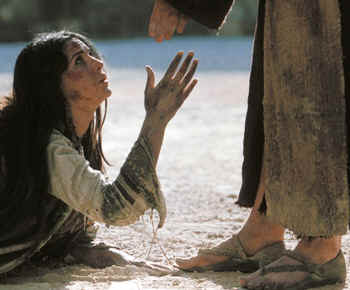 Romans 3:20-21 "because by the works of the Law no flesh will be justified in His sight; for through the Law comes the knowledge of sin.
Romans 3:20-21 "because by the works of the Law no flesh will be justified in His sight; for through the Law comes the knowledge of sin.
21 But now apart from the Law the righteousness of God has been manifested, being witnessed by the Law and the Prophets, 22 even the righteousness of God through faith in Jesus Christ for all those who believe; for there is no distinction."
Introduction:
We have been exploring these last two days what we are calling: "The Divine Dilemma of Salvation". In other words, how is it that a Holy righteous God could rightly and justly acquit sinners whom he desires to forgive? Answering this question is important in better understanding why Biblical salvation is so important. We listed four particular decisions needing to be made by God the Father, Son and Spirit to ensure the solution to this alleged dilemma:
1. God the Father had to willingly authorize salvation's plan.
2. God the Son had to willingly accomplish salvation for sinners with the Father's willing to acceptance of His accomplishment.
3. God the Holy Spirit had to willingly apply the salvation accomplished to those responding in faith to His call.
4. The Father had to willingly agree to accept faith in the accomplished work as necessary and sufficient to acquit the sinner
Paul's exposition of the Gospel in his letter to the Romans centers upon the doctrine of justification by faith. To define again what we mean by Justification by faith, the Baptist Faith and Message 2000 states:
"Justification is God's gracious and full acquittal upon principles of His righteousness of all sinners who repent and believe in Christ. Justification brings the believer unto a relationship of peace and favor with God."
We had looked at the first action done by God in the Person of the Father, namely: God the Father had to willingly authorize salvation's (see Romans 3:21-24). We noted briefly that in eternity, the Father, Son and Spirit had made what theologians call: "a covenant of redemption" between themselves. This internal activity of God was wholly separate from man, since humans and nothing else had yet been created. Today we move forward to consider further decisions made by God in the solving of the Divine dilemma of salvation.
God the Son had to willingly accomplish salvation for sinners with the Father's willing to acceptance of His accomplishment.
Hebrews 10:7 records for us God the Son's words as he was coming from eternity into time: "“THEN I SAID, ‘BEHOLD, I HAVE COME (IN THE SCROLL OF THE BOOK IT IS WRITTEN OF ME) TO DO YOUR WILL, O GOD.’” The reader will notice that the quotation is in all caps. The NASB does this to indicate that the quote mirrors an Old Testament text from Psalm 40. The Son of God uttered those words coming from eternity into time. The Son of God did this by way of His incarnation as the man Jesus of Nazareth (Matthew 1:21-23; Luke 1:35; John 1:14; Philippians 2:5-11; Colossians 2:9; Hebrews 2:11-14). As God, Christ's accomplished work of redemption would be enough, since salvation is of the Lord (see Jonah 2:9). As man, Jesus' shedding of blood would provide the price paid for such salvation - called by scripture "redemption" (see Ephesians 1:7). As Romans 3:24 tells us, this willing act of Christ was a work of redemption - that is - He was paying the price for salvation by a willing offering of His human life on behalf of sinners whom the Father loved. So The Father was willing to show mercy and the Son was willing to come, be incarnated as a man and offer Himself up on behalf of sinners. The Father agreed to accept all the the Son accomplished. But now, what about the Holy Spirit?
God the Holy Spirit had to willingly apply the salvation accomplished to those responding in faith to His call.
Romans 3:25-26 notes: "whom God displayed publicly as a propitiation in His blood through faith. This was to demonstrate His righteousness, because in the forbearance of God He passed over the sins previously committed; 26 for the demonstration, I say, of His righteousness at the present time, so that He would be just and the justifier of the one who has faith in Jesus." At this point, one may wonder where the Holy Spirit is in the Romans passage. In as much as Paul is focusing upon the actions agreed upon between the Father and the Son, the Spirit's involvement is implied. Consequently, in later chapters of Romans 5 and 6, we will see explicit mention of the Holy Spirit's activity in applying all that Jesus achieved and the Father authorized.
Scriptures such as John 16:8-11 and 2 Timothy 2:25 underscore the fact that unless the Holy Spirit is calling and convicting men and women, no one will choose on their own to get saved. The Spirit's work is His effort in applying the accomplishment of the Son.
Next time we will conclude this study by noting what all this combine working between the Father, Son and Spirit aims for in solving the Divine dilemma of salvation.









